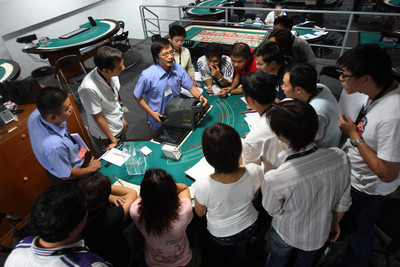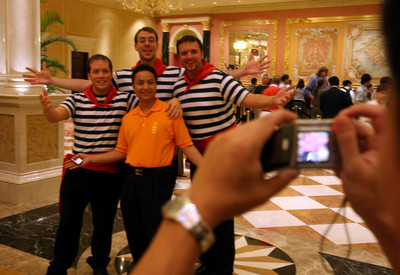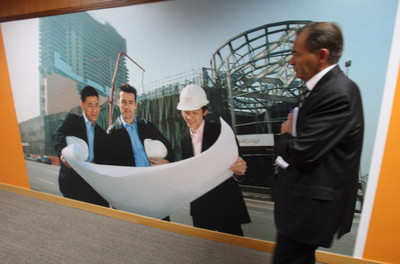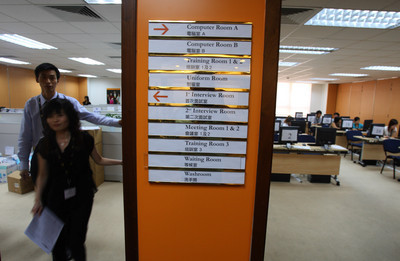A giant ‘Help wanted’ window
Editor's note: Review-Journal gaming reporter Howard Stutz and director of photography Jeff Scheid traveled to Macau to see how some of Nevada's largest gaming companies have helped the Chinese enclave pass the Strip in annual gaming revenues.
MACAU
When Wendy Yu went home and told her mother she was going to oversee human resources for a casino company, panic set in. What if her daughter had to fire someone? Would her daughter's arms be cut off by angry bosses?
Why would her daughter, with more than a dozen years experience in employee management, leave a comfortable position as the director of human resources for the Westin Resort on Coloane for a job in gaming?
Yu, vice president of human resources for the Wynn Macau, laughs when recalling the story. Her mother, a native of Macau, was focused on the old days of gaming. Casinos, operated by Hong Kong billionaire Stanley Ho, were reportedly influenced by Chinese organized crime triads.
Today, gaming has taken on a Las Vegas feel in Macau. Large hotel-casinos operated by Nevada-based companies have provided jobs for thousands of workers since 2004, all but eliminating unemployment in Macau. Meanwhile, casino workers have garnered benefits similar to their counterparts in Las Vegas.
Figures provided by the Macau Department of Statistics and Census Service show that at the end of 2006 Macau's 24 casinos employed 36,412 employees, 39.4 percent more than in 2005.
Meanwhile, the 216-room Crown Macau, operated by Melco PBL, opened in May with 4,000 employees. Las Vegas Sands Corp. opened the 3,000-room Venetian Macau on Aug. 28 with 12,000 workers. MGM Mirage is expected to open the 600-room MGM Grand Macau by the end of the year with about 6,000 employees.
Through July, unemployment in Macau, a city of 510,000, was 3.1 percent. The department estimated the total labor force at 310,700, with 301,200 employed.
Yu said potential casino employees are attracted by the reputation of American casino companies. Job applicants at Wynn Macau, which opened in September 2006, were attracted by the celebrity of Wynn Resorts Ltd. Chairman Steve Wynn.
"People saw the difference between an American company and a local company," said Yu, who spent three years before the opening of Wynn Macau putting employee programs and hiring schedules into place in order to bring aboard roughly 6,000 workers for the casino's opening a year ago.
"Mr. Wynn gave us the resources we needed because we had a challenge in filling certain jobs in this market that people prefer not to do," Yu said. "Employees have a lot of different choices."
Casino executives acknowledge that gaming industry jobs have made it tougher for smaller businesses in Macau to retain employees. The competition for workers is also fierce because of the relatively small labor pool and rules that govern certain job duties.
All casino dealers in Macau, for example, must be Macau residents. But with the minimum gambling age being 18, dealers can be as young as 18. Residents of neighboring communities in mainland China hired at the resorts cannot work in the casino areas.
"We have two restaurants in the middle of our casino floor," Venetian Macau President Mark Brown said. "People from mainland China cannot work in those restaurants."
The job market is expected to get even tighter through the end of the decade. More than a dozen hotel-casinos are under construction along Macau's Cotai Strip. Estimates show resorts already under construction could more than double Macau's current gaming industry work force. Las Vegas Sands Corp. will operate the bulk of the hotel-casinos on Cotai.
"Is the labor pool large enough now? Yes," Brown said. "Moving forward? No. That's not going to go away."
David Friedman, co-CEO of the under-construction Macau Studio City on the Cotai Strip, said he expects his concerns about hiring an expected 7,000 workers to ease.
"The Macau government seems to be working hard to plan ahead," Friedman said. "Everyone knows there's going to be a demand for a much larger labor force, and it's a focus of the operators as well. I'm comfortable that by 2009, much of these issues will be resolved and that we'll have a much more mature labor market."
Several casino operators are already planning for the future.
The MGM Grand Macau, which will open by the end of the year, has already hired most of its work force. To train casino employees, MGM Mirage purchased an old theater in a Macau residential area and turned the building into a makeshift casino with gaming tables, a cashiers cage, count room, surveillance and a training area for slot machine technicians. Classes run around the clock, just like a gaming operation.
MGM Mirage International CEO Bob Moon said Macau has few training options for dealers, so the company set up its own teaching program.
"This is a realistic as you can be," said Moon, touring the location where prospective casino employees were as active as any busy night on a gaming floor. "When we go live, our casino staff will have had countless hours of training and will be ready."
Moon said MGM Mirage has had little trouble filling its jobs at the MGM Grand.
Yu said Wynn Macau lost just a handful of employees when The Venetian Macau filled its large work force.
Sands Macau executives put steps in place to ensure that qualified employees would staff both The Venetian and Sands.
Many dealers at the Sands were promoted to shift managers and new dealers were brought in.
While the government requires dealers to be Macau residents, a large percentage of the casino supervisors at the Sands and Venetian are also locals. The process allowed the company to put experienced and novice casino employees at both locations.
"We had one of the largest dealer-training sites in the history of the gaming industry," Sands Macau Senior Vice President of Operations Walter Power said. "We trained 1,600 people off the street who had never dealt cards before and turned them into dealers."
London native Julian Fisher spent more than three years dealing cards at the Sands Macau. He is now a shift manager at The Venetian Macau.
"The opportunity here was incredible and it is continuing for all of us," Fisher said.
Australian native Karen Shepheard, assistant casino manager at the Sands Macau, was promoted when The Venetian opened.
"I don't mind living in Asia and I've watched this area grow," she said.
The availability of hotel-casino jobs has allowed Macau residents to shift careers and transfer into higher-paying, more glamorous positions.
The Venetian Macau's public relations department, for example, comprises employees from various backgrounds. Associate director of communications Buddy Lam was a television journalist. Public relations officer Emma Li was assistant to the dean at the Macau University Technical School. Public relations assistant Primrose Che was an airline flight attendant.
Katharine Liu, director of communications for Wynn Macau, was in public relations for Hyatt before joining Wynn. She grew up in Macau and said the American gaming companies have helped transform the city into a worldwide destination.
"Macau used to be a small city. Not any more," Liu said. "It's a lot more cosmopolitan now."
The job opportunities have also led to an influx of residents.
Jimmy Cheung, finance manager for Bally Technologies' Macau office, moved into his position three months ago from Hong Kong, where he held a similar job with Reuters. Cheung said he's in the process of applying for a permanent visa to reside in Macau.
"Macau has a lot more jobs now because of the gaming industry," said Cheung, a certified public accountant. "There are a lot of professionals looking at the growing number of opportunities here."
Over at The Venetian Macau, executives hired experienced gondoliers from The Venetian Las Vegas to operate the gondola rides inside the property's Grand Canal Shoppes, which has three waterways. Each afternoon, gondoliers pose for photos with guests in the hotel lobby.
Marciano Lapergola said the Chinese hotel guests are excited to meet people from Italy.
"In Las Vegas, guests never thought we were actually from Italy," Lapergola said. "Here, they want us to sing and be in pictures. It's an amazing experience."
Even Americans have found their way to Macau.
Reggie Martin, an Indiana native who has lived in Macau for five years, said there were about 500 Americans early in the decade. Now, there are roughly 1,800.
Martin, senior manager of special events and sports for The Venetian Macau, also serves as the American Consulate's warden and key contact for U.S. citizens visiting Macau because of knowledge of the region.
"There are some challenges for an American," Martin said. "Such as getting used to the culture and driving on the opposite side of the road from the U.S. The food is different but the adjustment is pretty easy."
Because of the Cotai Strip and other projects, construction jobs abound in Macau. Moon said MGM Mirage employed 3,700 construction workers on the MGM Grand Macau, of which 3,000 were from mainland China. Las Vegas Sands has some 15,800 construction personnel working on its Cotai Strip properties, of which 4,800 have come from mainland China.
Contact reporter Howard Stutz at hstutz@reviewjournal.com or (702) 477-3871.
MacauLas Vegas, Half a World AwayIn Depth Package
THE SERIES
Sunday: Macau is in the cross hairs of a multibillion-dollar building boom largely fueled by Nevada's major gaming companies, which are exporting Las Vegas-style casinos into a market starving for action.
Today: Thanks to the growing casino industry, unemployment is just 3 percent in Macau. But where will all the workers come from to staff the new casinos now under construction?
Tuesday: More than 80 percent of the table games in Macau are dedicated to the game of choice for Asian gamblers: baccarat. But the use of slot machines is growing, and Nevada's slot makers are trying to capitalize on the market.
Wednesday: Macau's Cotai Strip has more than 20,000 hotel rooms in various stages of construction. By 2010, the Cotai Strip will resemble the heart of the Strip in Las Vegas.
Thursday: American gaming giants Las Vegas Sands Corp., Wynn Resorts Ltd. and MGM Mirage are establishing footholds in Macau. But an Australian company, in partnership with the son of Macau's casino pioneer, is ready to challenge the experienced casino operators.




















